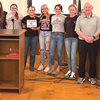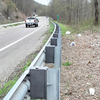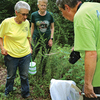Kitchen scraps, leaves make compost to enrich soil
Are you stringing green beans this week? peeling peaches for a cobbler? slicing apples to freeze? shucking ears of corn?
If so, you have materials for composting. Throw these “green” materials into a pail with banana peels, eggshells and coffee grounds, to mix later with “browns” —dried grass clippings and leaves you’ll collect this fall, so instead of sending them to the local landfill, they serve another purpose.
Composting requires both green and brown materials. In a perfect mix, the ratio is 3:1, brown to green, but there is no need to measure.
Two things should never be included: dairy products and meat. They may attract animals.
You need nothing fancy. In the kitchen, while you collect peels and vegetable ends for a few days, a small pail suffices or purchase a lidded bucket made for the process.
Outdoors, compost makes itself in a simple pile, or you can make or buy simple bins. My favorites are two wire fences, 4 feet by 4 feet. I own a fancy composter but abandoned it in favor of the wire bins. I purchased the wire fences which hook together, but you can make your own with chicken wire or four discarded pallets.
Don’t reject composting, believing it could be a messy, odorous process. It is not. I empty my kitchen compost bucket every few days, or when it is convenient, and it has no odor. If I spot a circling gnat or two, I am spurred to take it outdoors.
As the pile of greens and browns grows in your bin or pile, it is best to lightly turn it with a potato fork, but I often fail to do this and rarely detect the odor which tells me the process needs aeration.
Compost needs to heat up to break down into rich soil, but a pile 4 feet high and wide should prompt the necessary heat. It is best to locate your compost process where it gets sun.
It can take many months for materials to decompose enough to use it on a garden, but you can speed it if you occasionally turn the material or chop kitchen scraps. For instance, take time to roughly chop watermelon rind instead of tossing in the whole rind. A whole banana peel needs months to decompose, but if you chop it into pieces, it will break down in just a few weeks.
If the process seems slow, add more green. If you see flies or detect an odor, add brown material. An occasional scoop of garden soil adds microbes to help break down the material. Welcome all earthworms which appear.
The mass should stay slightly damp, but not soggy. If we don’t have rain, add water from a garden hose, or dispose of cooking water there.
If you have been depositing leaves and kitchen scraps at the local “convenience center,” adopting composting will help reduce the size of our landfill. And you’ll be glad when you realize how the finished product enriches your garden soil—for a cost of virtually nothing.
Sharon Daniels is a Virginia Cooperative Extension Master Gardener volunteer.
Please support The Coalfield Progress by subscribing today!
